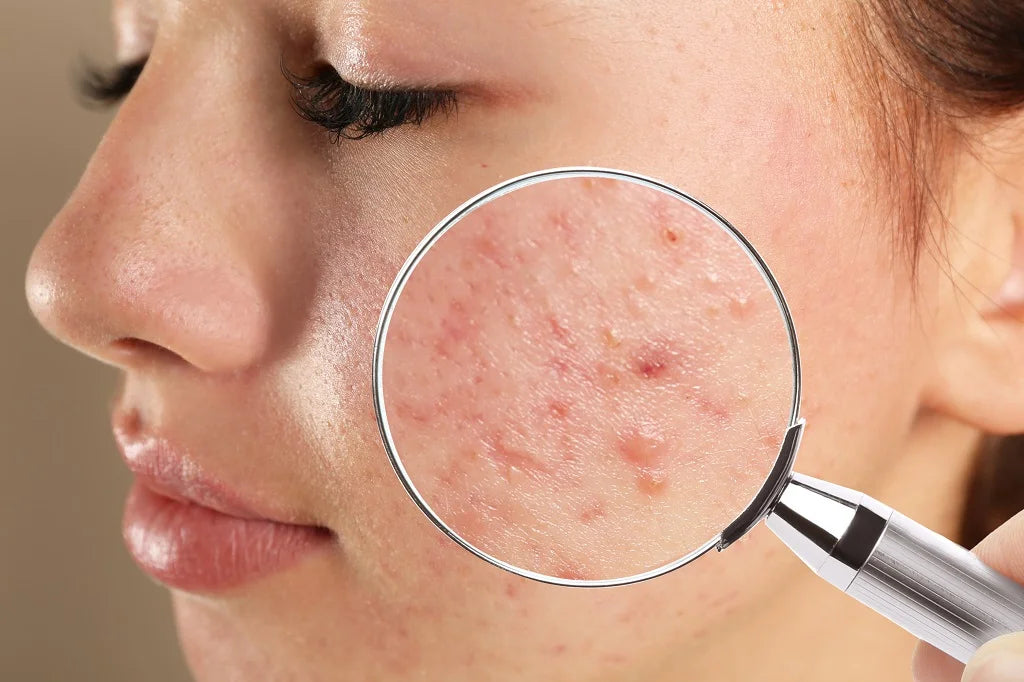
Debunking Acne Myths: 10 Things You Need to Stop Believing If You Want to Clear Your Acne

Dr. Deepthi Prasad, MBBS.
Written by Our Editorial Team
Table of Contents
- Top 10 Things You Need To Stop Believing To Clear Your Acne
- 1. Only Teenagers Are Affected By Hormonal Acne
- 2. Diet Can Be The Main Cause Of Acne
- 3. Dirt And Dust Adhering To Your Skin Can Cause Acne
- 4. Your Acne Will Only Get Worsen Up By Makeup
- 5. Moisturize Your Skin To Eliminate Acne
- 6. Exposure To Sunlight For Long Can Heal Acne
- 7. Eating Too Much Chocolate Can Worsen Your Acne
- 8. Toothpaste Will Dry Up Spots
- 9. Washing Your Face Is The Best Way To Prevent Breakouts
- 10. Drinking Lots Of Water Can Reduce Breakouts
Acne can take a toll on one’s confidence. The pesky bump on the face can force you to stop stepping out and socializing! We know; we’ve been there too. Though pimples might be uninvited guests to your facial territory, you need to accept them and keep moving forward, while looking for solutions to tackle them. It is normal for the facial skin to erupt into acne, but there are ways to zap those zits, and we are discussing just that in our blog today.
Most people think that their diet is the main culprit behind acne, others feel that spending time in the sun might help prevent it. There is a lot of misinformation about these flare-ups, and it's important that you educate yourself about them, if you want to cure them. People who suffer from acne and pimple often buy into hearsay and try out a variety of things that causes more harm than good. This blog will look into the different kinds of acne-related myths and bust them so that no one falls for them. Here you will gain insight into the right/ scientific ways of combating acne and what not to do.
Top 10 Acne Myths You Need To Stop Believing To Clear Your Acne
Here we will debunk 10 common myths with the science-backed ways to combat acne.
1. Only Teenagers Are Affected By Hormonal Acne
Acne is common among people in the age group of 10-35. Thus many of us think that puberty might be the main cause of acne. Your body produces more androgenic hormones during puberty, causing your skin to become oilier and more prone to acne. Hence, your facial skin becomes prone to hormonal acne, starting from the beginning to your teens and continuing till your 30s or even your 40s. Women are more likely to experience adult hormonal acne due to their menstrual cycle and fluctuating hormonal levels.
The good news is that adult hormonal acne can be treated. Experts suggest treating adult acne using topical acne treatments combined with birth control pills.
2. Diet Can Be The Main Cause Of Acne
There is a common myth that oily food can be the main cause of acne. But the fact is that your diet does not have much to do with acne. As per the latest study, there is no direct correlation between the specific food you eat and pimple development.
Oil in food is converted into energy by the body, which is used as fuel or stored as fat to be burned later. Thus eating oily food does not necessarily cause acne. But consuming sugar, on the other hand, can flare up acne, though there is not much scientific evidence to prove it.
3. Dirt And Dust Adhering To Your Skin Can Cause Acne
Have you ever woken up with a pimple after going to bed without washing your face? You might feel that the dirt and oil adhering to your skin is responsible for your acne. However, experts believe that your hygiene level doesn’t have a big role to play in the development of acne.
According to experts, acne is formed when your pores get clogged by dead skin cells and sebum. Thus regular cleansing and exfoliation are necessary to have clean and clear skin, but it won’t help to completely get rid of acne.
4. Your Acne Will Only Get Worsen Up By Makeup
It is a common belief that makeup can accelerate acne flare-ups, which is not true. Acne is caused mainly due to the accumulation of dead skin cells and sebum in the pores of the skin. A bacterial infection can flare up things leading to red, swollen, and inflamed cystic acne.
Experts advise that if you have acne-prone skin, it is advisable to use oil-free and non-comedogenic skincare products which will not clog your pores. Skincare products containing zinc oxide and silica can control sebum production to a certain extent, thus, avoiding your pores being clogged, thereby preventing acne and acne scars.
5. Moisturize Your Skin To Eliminate Acne
It is a common belief that moisturizing your skin keeps acne, blackheads, and whiteheads at bay. But the fact is moisturizing does nothing to heal or worsen your acne. It only hydrates your skin, keeping your skin soft and smooth.
With that being said, there is some evidence that moisturizers work in conjugation with other science-backed acne-treating products.
Also Read : Skincare Routine For Acne-Prone Skin
As per a recent study, moisturizer can alleviate dry skin conditions and has a soothing effect on the skin of people who are using topical acne-treating ointments such as salicylic acid, retinoids, and other antibiotics. Hence you can effectively include a moisturizer in your topical acne prevention regime for getting rid of acne scars and acne.
6. Exposure To Sunlight For Long Can Heal Acne
This is the most common myth which has been proved wrong. Exposure to sunlight in a small amount is considered to be beneficial for maintaining healthy skin. Still, too much sunlight can damage your skin and trigger skin problems like acne, (especially fungal acne), pimples, blackheads, and whiteheads. Exposure to UV rays can tan your skin, making it look dry and dull. Sunlight can cause sweat and sebum production, clog your pores and flare up acne and pimples. Experts recommend sunscreen with an SPF of 30 or above to protect your skin from sun damage.
Also Read : SPF : What Is It? What Are It's Types?
7. Eating Too Much Chocolate Can Worsen Your Acne
Chocolate has long been blamed for acne breakouts, but scientists say this is not true. However, there is a lot of contradiction on this topic. The concept of eating too much chocolate can trigger a breakout originated in 1969. But it was proven wrong within a couple of years.
However, a clear picture is still lacking on this topic, and the controversy remains.
8. Toothpaste Will Dry Up Spots
Many of you might have seen the TikTok videos that promote using toothpaste on the spots and leaving it overnight to dry out the acne. So does this hack work?
Experts reveal that applying toothpaste to your acne spots does not necessarily dry up the spot. Yes, there are some antiseptic ingredients in the toothpaste, but other ingredients can aggravate your skin condition. Therefore, it is always advisable to use anti-acne face washes, and topical creams containing anti-bacterial ingredients, such as benzoyl peroxide or tretinoin. Applying topical anti-acne ointment can help control fungal acne to a certain extend.
9. Washing Your Face Is The Best Way To Prevent Breakouts
It might sound good to wash your face frequently to keep dirt and grime away from your face. But washing your face frequently does not prevent breakouts. Acne is formed when dead skin cells combine with sebum and block the pores of the skin.
Incase you can invest in skin care products suitable for acne-prone skin. Why don't you check out ThriveCo's Goodbye Acne Kit. It comes with a cleanser and serum containing Diacnemide, Azelaic Acid, Niacinamide, and Witch Hazel immensely effective in fighting acne.
Buy ThriveCo Goodbye Acne Kit
Frequent washing will make your face dry, which triggers sebum production and the excessive sebum along with dead skin cells block the pores, resulting in acne and pimples.
10. Drinking Lots Of Water Can Reduce Breakouts
Drinking water is beneficial for keeping your skin healthy and hydrated. Skin dryness can cause your body to produce excess sebum, triggering breakouts. Hydrated skin looks healthy and well-nourished, but there is no scientific evidence that drinking lots of water can reduce acne and pimples.
Don’t go by myths, if you have acne-prone skin, it is always advisable to consult a dermatologist and use science-backed and result-oriented products that will work from the very root, to control acne flare-ups. It is crucial that you do your own research, see what will work for you rather than believing in myths.
About Doctor :

Dr. Deepthi Prasad specializes in Dermatology, Cosmetology, and Aesthetic Dermatology and has been practicing for over 15 years. After completing MBBS from Dr. NTR University of Health Sciences Andhra Pradesh in 2009, she earned a MD in Dermatology, Venereology & Leprosy from Osmania Medical College in Hyderabad in 2014.
Disclaimer: All the content published on www.thriveco.in is solely for information purposes. It is not a substitute for professional medical advice, diagnosis, or treatment. Always consider seeking the advice of your physician or a qualified healthcare provider. The information, suggestion, or remedies mentioned on this site are provided without warranty of any kind, whether express or implied.
 2 FREE GIFTS on all orders of ₹800+
2 FREE GIFTS on all orders of ₹800+ 






